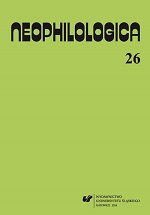ÊTRE (LE) TÉMOIN DE, un prédicat approprié sélectionnant les noms d’événement ?
ÊTRE (LE) TÉMOIN DE, a dedicated predicate which selects event nouns?
Author(s): Ewa PileckaSubject(s): Language and Literature Studies
Published by: Wydawnictwo Uniwersytetu Śląskiego
Keywords: event noun; distributional definition; dedicated verb; adverbial of time; adverbial of place; grammaticalization
Summary/Abstract: Considering all kinds of definitions, the distributional definition seems the most useful when we want to determine the class of event nouns, in particular, there exists a series of dedicated verbs (e.g. avoir lieu, se produire, survenir…) which select event arguments. In this paper we try to see whether the phrase être (le) témoin de may join the series of dedicated predicates, and if so, under what conditions. A corpus study enables us to ascertain that, if a nominal phrase expressing time or place appears as the subject of this verbal construction, it causes a nominal phrase expressing an event to appear as the object. Grammaticalization marks are visible at the syntactic as well as at the semantic level. The exchange of functions makes the noun phrase in the position of a subject acquire the status of an adverbial, the event noun in the object position — that of the main predicate (nominal), and the expression être (le) témoin de becomes the grammatical support thereof. The grammaticalization takes place preferably in propositions in the past or future tenses, and is often based on a personification or a meaning transfer as a metaphor or a metonymy.
Journal: Neophilologica
- Issue Year: 2014
- Issue No: 26
- Page Range: 49-62
- Page Count: 14
- Language: French

